|
|
Post by maddogfagin on Nov 8, 2016 15:58:43 GMT
animalfair.com/jethro-tulls-ian-anderson/ Posted on January 3, 2003 Jethro Tull’s Ian Anderson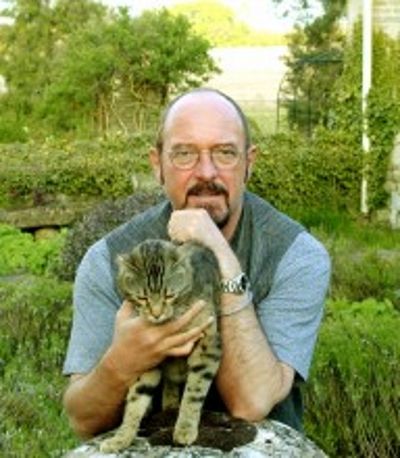 “Sometimes it’s the unexceptional ordinary little guys that stay with you the longest, like the old black cat mentioned in the song,” answered Ian Anderson, lead singer and flutist of the seventies rock band Jethro Tull, when asked about a favorite pet. Ian Anderson has just released a new solo CD entitled “Rupi’s Dance”, named after a feral kitten that his family adopted. Anderson’s new release, a blend of images and Celtic/Middle Eastern influenced folk rock, contains a couple of animal friendly songs, including one about an old black cat that called Anderson’s “farm in the southwest of England home.” “The Old Black Cat” was one of the least demonstrative, least interesting creatures, he was just there, an old black cat.” The song is both a dedication to the old black cat but also serves as a personal reminder for Anderson that “all animals, people and things are more worthy of attention, respect and acknowledgement than I give them.” Good reminder for all of us. Anderson has an intellectual fascination as well as a fierce love of cats. He explains that cats are the one species that meanders between the parallel worlds of wild and domestic. Anderson’s relationship with felines is “protective, helpful and practical.” On the Jethro Tull website you’ll find an entire section entitled ‘Wittering on About Cats,” filled with personal writings and information along with links about small wild cats. Many of these wild cats are in need of protection, including the Andean Mountain Cat, “one of my favorite mystery cats,” which has recently been photographed for the first time. Anderson also offers his advice on how to raise kittens, and has saved more than one litter of abandoned newborns. Anderson has a special skill in raising feral kittens, “hissing spitting balls of fur that hate people until fed for a week.” He has been a big supporter of the Fund for Animals in their Campaign to Spay and Neuter Cats and Dogs. Although Anderson does not consider himself an animal rights activist, he finds the cruelty toward animals in this world appalling. He believes that the key is educating the international public in hopes that it will force governments to act in protection of animals. Anderson’s interest in animals may in part be due to his contemplative nature. His siblings being many years older, Anderson grew up alone, and found an affinity with animals greater than what he felt with humans. When not on tour or in the studio, you might find Anderson wandering through the woods with a cat balanced on his shoulder. “Rupi’s Song” is the title track of Ian Anderson’s new solo CD. So, who is Rupi? Take your pick! According to Anderson, Rupi is a rescued runt of a feral litter, a study in the personification of animals, a study in male and female archetypes of sexuality, and the Hindu name for beauty. Asked whether his animals enjoy his music Anderson noted that, “the dogs hate the flute, the cats pay no attention, and the horses, sheep and chickens don’t seem to have a clue.”
|
|
|
|
Post by maddogfagin on Nov 10, 2016 9:14:13 GMT
|
|
|
|
Post by bunkerfan on Nov 10, 2016 10:49:53 GMT
The opening brings back memories of me given the cane almost every other day when I was at school.  |
|
|
|
Post by maddogfagin on Dec 5, 2016 10:15:33 GMT
jondawson.com/2016/12/04/podcast-ian-anderson-of-jethro-tull/PODCAST: IAN ANDERSON OF JETHRO TULL DECEMBER 4, 2016 MR. TIBBS During a recent dig through the JonDawsonHQ vault, I turned up this lost podcast with Ian Anderson of Jethro Tull. At the time of the interview, Anderson was promoting his solo album “Homo Erracticus”. Further topics covered include Jethro Tull, immigration, Pete Townshend and whimsy. CLICK HERE to listen to the show.
|
|
|
|
Post by maddogfagin on Dec 18, 2016 16:21:45 GMT
|
|
|
|
Post by nonrabbit on Jan 5, 2017 16:15:00 GMT
|
|
|
|
Post by nonrabbit on Jan 5, 2017 18:32:56 GMT
Here's an oldie but goody interview I came across by an Andrew Harvey for People (?) - April 1985
There's quite a bit of newish info - if you can believe it
"The tall, bearded man in the white coat and hard hat walks briskly across the floor of his salmon-processing factory in the north Scotland city of Inverness, past women slicing smoked sides of salmon and racks of salted fish browning in an oak-smoke kiln. With the glibness of a lifelong expert, he talks of stocking densities, water flow, disease risk, cage design, mooring methods, percentage yields and other arcane aspects of his trade.
Except for the mass of disheveled hair and scraggly beard, there is virtually nothing to connect this cool entrepreneur with the eccentric, mesmerizing musician whose stage antics once earned him the sobriquet “the deranged flamingo of rock.” Yet this is none other than the lead singer and flutist of the ’70s’ supergroup Jethro Tull, Ian Anderson, 37, who, in the twilight of his musical career, is going from Aqualung (the group’s classic 1971 LP) to aquaculture—and achieving equally impressive results.
Anderson got into salmon farming in 1978, after purchasing a rugged, 15,300-acre estate on the remote isle of Skye off northwest Scotland. He hired a trained staff of three workers and one manager, read a few books on the subject, began growing salmon in cages submerged in the adjacent Loch Slapin and produced his first mature salmon three years ago.
He grossed $500,000 last year from a two-and-a-half-ton weekly harvest, selling his smoked delicacy to top London shops such as Harrods and Selfridges and, through a contract with Qantas, supplying all airlines flying out of Australia. Prince Charles recently ordered a special consignment as gifts for his staff.
Now Anderson has begun to expand his business to the U.S. as well, with arrangements to deliver 20 tons of fish this year to delicatessens in Florida, Texas, New Jersey and New York.
“Shoppers are going crazy for Scottish salmon because it’s so much better than anything they’ve ever had,”
claims Anderson, who, with a salesman’s smile, dismisses the Pacific variety commonly eaten as lox in America as coarse, salty and bland. “This year a number of British producers are making a major exporting effort in the U.S. It is the year to establish the superiority of Scottish smoked salmon.”
It’s clear Americans are taking the bait. The British salmon-export trade with the U.S., virtually nonexistent in 1982, is forecast to leap to more than 500 tons this year. Most of the salmon is farmed by the giant Marine Harvest Co., which has 18 farm sites in Scottish lochs (coastal inlets), but Anderson is already making a dent in its business. Marine Harvest, in fact, held the lease on Loch Slapin when Anderson bought
“In a way I regret my behavior because I was a bit pompous and aggressive,” he says. “We are all more gentlemanlv in our dealings now.” Anderson has since surveyed 30 more potential fish-farm sites on Scotland’s west coast and expects to develop three or four new farms this year. “I believe I have actually tied up the rest of the country,” he says with a grin.
The musician’s love for Scotland was fostered during his childhood in Dunfermline, across the Firth of Forth from Edinburgh.
At 12, however, his parents moved to the English seaside town of Blackpool, where they operated a boardinghouse and a corner grocery.
Anderson, who says he “recoiled at the dreadful normality of it all,” quit school without his parents’ permission, worked at a newsstand, spent some time in art college and in 1967 set off for London with some musical friends to try his luck.
Only after he returned in triumph two years later with the hit record Living in the Past and enough money to buy his parents a new house did they finally warm up to their wayward son. Gold albums, platinum albums and world tours have filled Anderson’s years since then; Jethro Tull has generated more than $100 million, making Anderson a multimillionaire.
In 1976 he married Shona Learoyd, a former secretary at his Chrysalis record label. (The couple has a son, James, 8, and a daughter, Gael, 6.)
They bought a 16th-century redbrick farmhouse with 630 surrounding acres in Buckinghamshire and two years later purchased the Scottish estate, pumping $120,000 into restoring the property’s derelict 11-bedroom Victorian mansion. “I’ve always had a passion for the wilder and more rugged parts of the country,” says Anderson.
“And like most expatriates I rather fancied having a wee corner of Scotland waiting for me when I weaned myself away from music business.”
Anderson travels from Buckinghamshire to Scotland regularly, flying to Inverness to inspect the factory and journeying by road and ferry 80 miles to visit his spread on Skye. Despite the steady growth of his fishery, he still found time to devote most of the last year to music, recording a new album and touring through Europe, America and Australia.
But the loss of his voice, probably from fatigue, at the tail end of his U.S. jaunt convinced him that it might be time to contemplate at least partial retirement.
“I wouldn’t like to do this and not ever play music again,” says the increasingly successful entrepreneur. “But I’m at the point now where there’s no way I’d be happy just being a musician the rest of my life.”
|
|
|
|
Post by steelmonkey on Jan 5, 2017 21:20:10 GMT
1985: The twilight of his musical career. Surprise !
|
|
|
|
Post by maddogfagin on Jan 6, 2017 8:54:09 GMT
|
|
|
|
Post by maddogfagin on Jan 10, 2017 9:06:22 GMT
www.echo.net.au/2017/01/the-tell-on-tull/← All Entertainment, Byron Echo, Interviews | January 10, 2017 | by The Echo The Tell on Tull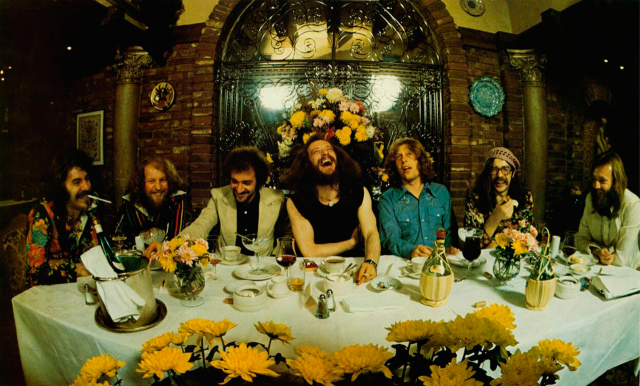 There’re a few things about Ian Anderson from Jethro Tull that you might not know. Firstly, he has a wicked sense of humour, is the passionate grower of very hot chili peppers and is an animal conservationist for The Andean Mountain Cat and more to discover in the Q&A below. You are one of the few people in the world who are known equally by two stage names: Ian Anderson and Jethro Tull. Which do you prefer and why? Nowadays I prefer Ian Anderson, but the repertoire is still Jethro Tull so both are valid concert billings. In my passport, it says Ian Anderson. No mention of Jethro Tull! You are famously recognised as a flautist… but you are a multi-instrumentalist. Was the flute the first instrument you gravitated towards? Which is your favourite instrument? I started with guitar, of course, like many others in the 60s. But the flute was a point of difference so it became the instrument I am most associated with. No-one confused me with other bands and artists. And so, it remains my favourite instrument to this day. But the guitar is more useful for writing songs. You were last at Bluesfest in 2011 – and absolutely nailed a packed tent. Has the band changed since then? No – the same bunch of jet-lagged old guys with valid visas and no previous convictions. Just in case the Department of Immigration and Border Protection are reading this… New members? Not unless someone stowed away in my luggage. In which case the Border guys will get them, for sure. What can we expect to see in your festival performance this year? A selection of best-of material, of course. Maybe one or two new songs depending on our allotted set length. If the money’s right, I can toss in Smoke on the Water and Whiter Shade of Pale. Or should that be a lighter shade of ale? You have a band member whose role is listed as ‘vocals and stage antics’. What do ‘stage antics’ entail? Tomfoolery, jigging about and bum-wiggling. But that was Ryan O’Donnell, guest vocalist, who is currently Ray Davies in the London musical Sunny Afternoons. Otherwise engaged, although he is a virtual guest on our big video screen on full production tours. A bit impractical at a multi-act festival, however. Wasn’t this your role in the early years? Still is if I’ve remembered to drink my half-bottle of Jack Daniels before the show. Brings out the inner Ollie Reed in me. You made an album with one of the best titles… ever: Too Old to Rock and Roll – Too Young to Die. A concept piece about a fading rock celebrity (any relation?) who finds, when he wakes after many years in a coma, that his fashion and music style has turned full circle and he is relevant and the toast of the town again. You said that point of the album was to illustrate how his style of music may go out of popularity with every other fashion and fad, but he is determined that, if he sticks to it, everything comes back around and the style will rise again. Did you ever feel Jethro Tull went ‘out of style’? Absolutely! Again, again and again. In and out, up and down like a sailor’s trousers. Do you think that you have come full circle – and it is your time again? My time is 06.30 every morning when I wake up. It is my favourite hobby. Waking up. I try to do it as often as possible. Staying on albums… there’s been a trend for the older generation of stars – with enormous back catalogues – to feature one album each performance night of a tour. Or a tour based specifically around the performance of an album track by track in order (Springsteen, Brian Wilson, Patti Smith). Have you ever done that – considered that? Been there, done it. Aqualung, Thick as a Brick tours, but I think audiences want a bit more variety. After all, the albums have been quite different from each other so not everyone likes the same records. It may not be so well known that at one time you were considered as a ‘heavy metal’ band. Indeed, in 1988 you beat Metallica to the Grammy for the Best Hard Rock / Metal Performance. Was that a shock? It was certainly a shock to Metallica. They had to shelve all the Metallica Grammy Winners T-shirts for another year. But I do have a heavy metal flute: 0.997 pure silver. If I can find one in plutonium, I could glow in the dark. What three other things about Ian Anderson that people may not know? (salmon-farm owner / deep-vein thrombosis survivor and awareness campaigns spokesperson… a ‘Prog God’ Award recipient…?) Grower of very hot chili peppers. Supporter of the Christian Church – not the religion so much as the old smelly buildings themselves. I do charity shows each year for the maintenance and upkeep of our great medieval cathedrals. I am engaged in the conservation of small wild cat species too from time to time. Check out the Andean Mountain Cat. What / who are you inspired by and listening to right now? Muddy Waters, Beethoven and Varttina, the Finnish folk band. Right now, I am listening to Marc Almond’s new, as-yet-unreleased song that I just guested on, called, Lord Of Misrule. A perfect Christmas song that we will play together at Worcester and Winchester cathedrals in December. What’s your ‘secret song’, when no-one is around… what song are you playing? Convoy by CW McCall. Perfect for US tours when we are barrelling down the freeway to the next town. You’ve been married for thirty years. Can you remember your wedding song? Forty years, actually. It was a long time ago. I don’t think they had invented the gramophone back then so we didn’t have a wedding song. But, for my daughter’s wedding (married to actor Andrew Lincoln, Rick Grimes of the Walking Dead) it was Handel’s Arrival of the Queen of Sheba. Followed by Nina Simone’s Feeling Good. Jethro Tull performs at Bluesfest 2017 on Easter Sunday.
|
|
|
|
Post by maddogfagin on Jan 18, 2017 15:31:19 GMT
planetmosh.com/ian-anderson-interview-december-2016/ Ian Anderson – Interview – December 2016 Ian Anderson – Interview – December 2016Posted on January 18, 2017 by Dominic Forbes in Interviews 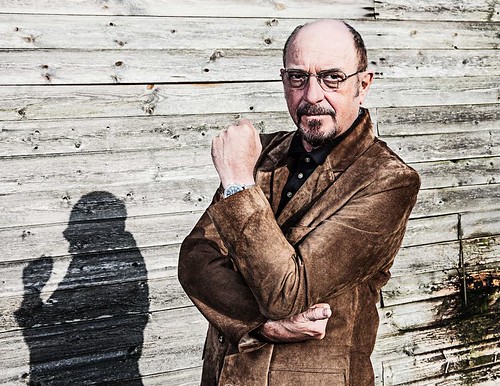 When I knew I had a long sought out interview with Ian Anderson a week before Christmas 2016, I went straight to every interviewer’s first source of research – his website.
There’s a part of the site called All too frequently asked questions, designed to get boring questions out of the way so the interviewer can concentrate on asking something that stretches Mr Anderson.
So I ditch any thought of asking how did the name Jethro Tull evolve (18th century English agricultural pioneer who invented the seed drill), Do you like rap music (considers it like nursery rhymes with attitude) and why does he think Jethro Tull’s music has lasted so long (loyalty of fans).
DOMINIC: Ian, let me take you back to 1988 when Jethro Tull won the Grammy for the best hard rock/metal album. Did this attract more metal fans to your shows?
IAN ANDERSON: Not as the result of the Grammy, no. I don’t think anybody made that mistake, if they were a fan of heavy metal or hard rock,”Oh, we’ll go along and see Jethro Tull”.
From our second album on, there’s been elements that would have been hard rock in terms of sound, that’s been a little part of my approach as long as I can remember as a songwriter. I’m a more complex and difficult soul in the sense that I delight in the eclecticism in much of that popular music that I suppose became known around ’69, 70 as progressive rock.
It’s taking music from a variety of sources bringing it into something that isn’t always a success story can be quite bombastic and complicated and a torture to listen to, when you get it right it’s a delight to bring in elements of many different sources and that’s kind of what I do so of course there’s a bit of heavy metal in Jethro Tull, there must be otherwise Iron Maiden wouldn’t have recorded one of my songs on their first album and Joe Bonamassa wouldn’t have been playing one of my songs since he was a teenager and picked up an electric guitar and stood in front of an audience. There’s obviously some elements of hard rock and even, I suppose, metal that has appealed to people just as some of the more folky and acoustic stuff has appealed to other bands.
I quite often meet people from other rock bands and other varieties of sorts of music who say, “Ahh, I like to play this when I was a kid”, or came to a concert in such and such and you realise you were one, just one, of the very many influences they would have had in their lives and if you play a tiny part in the shaping of somebody else’s musical career then it’s something to feel quite good about, and I hear that often so it applies not just to musicians but to fans as well . You’ve been part of their musical experience; even if it’s just a little bit here and a little bit there that they know you from.
DOMINIC: Do you consider this part of your legacy?
IAN ANDERSON: If by that you mean jack of all trades, master of none, the answer is yes.
DOMINIC: I wouldn’t dare to be so insulting.
IAN ANDERSON: That’s sort of how I see myself as someone who is , I’m kind of like a good Polish builder, I can fix your plumbing , lay a carpet, I can mend your roof . I’m the guy who can reliably do a bit of that and a bit of that. But I’m not particularly well trained in any particular area but sometimes people like people like me and, dare I say, Polish builders because they’re hard working, they deliver the goods, they get the job done and they have a variety of skills and they do so with I suppose a degree of passion and they like what they do and they want you to like what they do. That’s my approach to music. I’m there primarily to do this for me and for me to enjoy what I do but if you’re enjoying it too that’s a real big bonus.
DOMINIC: Investigating a little further what you’re saying about almost learning on the job, is that how you learnt the flute as you were originally a guitarist?
IAN ANDERSON: I was a guitar player, one of, if not hundreds then tens of up and coming players at that time and I knew I wasn’t going to join their ranks, I wasn’t that good, I was just another guitar player. At the same time there was Jeff Beck and Ritchie Blackmore and Jimmy Page and Eric Clapton. Guys who I quickly realised were well ahead of me and for me to catch up, and probably not have that talent; it seemed like a good idea to find something else to do. I already knew by then I was never going to be a great singer, by the time I heard Robert Plant in 1968, I thought, God, I hope this guy doesn’t hope to learn to play the flute. You find something you can do and the other people can’t, and another of those awful analogies being a big fish in a small pool is sometimes more rewarding immediately. It’s not like I’m the only flute player in rock music but probably, arguably, the one that people think of first.
DOMINIC: You’re recognised for standing on one leg.
IAN ANDERSON: Along with a few others. I can claim some originality in the sense I was entirely innocent of there being any predecessors in that way, but standing on one leg is something that kind of came to me when I started playing the flute in February 1968 at the Marquee Club,. I just picked it up, I don’t know why. Just seemed a kind of weird balance thing. Playing the harmonica standing on one leg, playing the flute standing on one leg, it just became a bit of a fun thing. It was about 1991 when I visited India on a promotion trip and to my horror, journalists thrusting pictures of Lord Krishna under my face and getting a little testy about the fact they felt I was being somewhat disrespectful by copying his flute playing stance. I was quite shocked because I really didn’t know about that pictorial image of Krishna standing with one leg crossed over the other playing his Indian bamboo flute to seduce the young goat herders which apparently he was doing. To this day, I don’t notice many goat herders in the audience but I suppose there might have been the odd one or two, maybe I had some impression on them in my time.
There are indeed dotted through history one legged flute players, from the fictitious pied piper of Hamelin who’s usually depicted dancing on one leg down the street, playing not a transverse flute like I’m playing but something that was more like a clarinet, probably a reed instrument. But in popular fiction, he’s thought of as playing a flute to seduce the young children as opposed to the goat herders. It goes back to both North and South America. The tradition of Indian Gods, they were flute players who stood on one leg and danced around. Once I found out about Krishna, the artwork depictions of Krishna, one of the many Hindu Gods, I set out to find if there were any other parallels and I was quite shocked to find out there were quite a few from different times and different continents on planet earth. It’s just one of those weird kind of X files episodes.
DOMINIC: If I was to sum up for me Jethro Tull, I’ve always seen you as being able to achieve commercial success without compromising your music. Would you agree with that?
IAN ANDERSON: Ultimately, yes I would agree but there have been times when I deliberately set out to write something in order to get some kind of commercial result, usually in order to help promote an album. When our manager asked us back in 1969 on our first American tour, “Can you just quickly write a hit single so we can release something back in the UK so people don’t forget you while we’re away in America?” “Sure, give me ten minutes. I’ll be back”
And I wrote a piece called Living in the past, and I took it as a bit of a joke really, because I wrote it in 5/4 time signature, which was definitely not something you could dance to. The title, living in the past, was as untrendy and definitely not a contemporary notion. So really, on all counts, it was not something that was likely to have chart success but I was able to give it some kind of memorable and fun element that made people forget the potential complexity of it being in 5/4 time, and just enjoy the groove, and enjoy the feel and the melody, and indeed it was a top ten hit in the UK and a couple of years later, even in the USA. It’s difficult when you set out to write something with a view to it being commercially accessible. You find sometimes afterwards it’s left a bit of an odd taste in your mouth. It was many years before I found it in my heart to play living in the past live on stage.
There are a couple of other songs I released over the years as singles which I really don’t care to play at all. One I never played was ring out Solstice bells. I’ve never done that live on stage and I was playing it in a church in Radevik a couple of days ago, and I thought I could do this in the way I did it with the string quartet album. Maybe next Christmas it will be one of the songs we play at Durham Cathedral, Bradford Cathedral. It might find itself in our Christmas repertoire. 41 years. Makes it quite a long time after I first started playing it if I play it live on stage next year.
Interview by Dominic Forbes
|
|
|
|
Post by maddogfagin on Jan 20, 2017 11:28:13 GMT
Published on 13 Jan 2017
Ian Anderson interviews on MuchMusic, Toronto, December 17, 1991.
|
|
|
|
Post by maddogfagin on Feb 2, 2017 9:07:42 GMT
|
|
|
|
Post by JTull 007 on Feb 8, 2017 2:53:47 GMT
Singer Ian Anderson would like to have silence  LINK LINK 
The legendary band Jethro Tull will perform in February in Kosice The charismatic Scottish singer and flutist Ian Anderson (69), after twenty years,
returns with the legendary band Jethro Tull in Eastern Slovakia.
In Košice a concert on February 17 and corsairs before him, gave an exclusive interview.
At nine in the morning we found him in the recording studio for nearly a half-hour conversation
he could tell a lot of interest not only about music from different perspectives, but also about his
remarkable life. Soon set out on another series of concerts under the name Jethro Tull Ian Anderson.
How will you spend these days while you go on the road?
- We do the demos,
gradually going through them and I have a few days to I rehearsed twelve new pieces that will be recorded.
As part of the current tour it's been twenty years since playing in eastern Slovakia, Košice.
Do you remember a concert amphitheater in Prešov in 1997?
- Unfortunately, not because I do not remember even what I did last Friday ...
It is difficult to maintain in mind the sequence of cities, airports, hotels and concert halls.
When you get off the plane, everything seems familiar, but it's hard to remember some details.
Rather, I remember that, when something goes wrong. Therefore, if you say you do not remember,
it had to be all right.
For those about ten thousand fans from Slovakia, Czech Republic, Poland and Hungary,
as well as through actual,it is still a legendary concert. Now, instead of the amphitheater
featured in the Social Pavilion. Was it the intention that for years avoiding large halls?
- This is going back even to the beginning of the seventies. In the UK and across Europe,
we always played in theaters and room for five hundred to two thousand people.
Suddenly we were in the US and concerts in large arenas. At that time there was a high demand
for tickets for Jethro Tull and promoters wanted to make more money for themselves and for us.
But it was not exclusive, it is also hard to say that I enjoyed it like playing in theaters, that we lacked.
I love theater, the atmosphere and tradition. I like also that the audience comfortably seated,
the stage goes good sound and it gives me the feeling that together we can better communicate.
That's why I never quite did not enjoy performances at Madison Square Garden and other major
halls in the United States. It was nice to feel a large audience, but it never beats the theater.
Not everywhere in the world have a nice theaters, and concert halls, but if you tell me that we have
to play in a sports hall or in a tent at the festival, unfortunately refuses to do so. If it's a nice place,
it will be my first choice, right from the beginning, like I was with the music in the beginning.
The musicians begin at the club. What is your relationship to them?
- You know,
clubs are claustrophobic feel sweat all over the area, it is hot and in truth I did the first few years,
when we were playing in blues clubs, for example, did not use much. Some people are taking the club
playing, I like the theater. I remember the pleasure when we get when we can afford
to play in the theater, we already want to return to the club.
When you do music in theaters,
it will be reflected on the atmosphere and energy that the audience will return ...
- Energy is like a family car, to fill up the cheapest petrol. Certainly not ride fast.
If you spent more money and bought a vehicle that can drive high-octane fuel, your car will react
better and run faster. And it is also indicative of how when you're on stage in front of an audience.
When you feel the energy from the audience, thanks to the keep warm. But I have to drive my car
so that I was not addicted to fuel high energy level. I need to make sure that my car will go well,
even if the audience fall asleep. I have to know that I can go safely and thus bring an excellent
performance. Of course, helpful to the audience reacts, but you can not claim, as some cultures,
publish, cities, even nations from each other at least a little different.
You and the music of Jethro Tull has traveled the world. How you feel?
- If I play in Japan, it's relatively quiet audience, they include Germany, it is also relatively quiet
and audiences in Britain as well. But it includes the US, the audience is more vigorous than in Italy,
Spain or Latin America. Man sometimes generalizes, but basically right. There are ethnic stereotypes,
but nevertheless I believe that I must be able to perform at the same level, even if the audience
be looked at me with eyes rolled out. It's up to me. I still have to be able to put everything into it
and reach a maximum, as much as possible and thereby made it all more pleasant.
After decades doing music in your concerts appearing to several generations of fans.
Why is it that you can reach each new generation?
It's up to young people. Many want to see how the band has evolved in the last fifty years.
It's a musical generation of their parents and want to know with what their parents were
the same thing, what books they read, what movies and watching what rock bands they liked.
It's part that the children know their parents and to better understand them.
|
|
|
|
Post by JTull 007 on Feb 9, 2017 22:00:56 GMT
This may be posted as a streaming or Mp3 interview somewhere...
Rock legend Ian Anderson of Jethro Tull joins Eric from Pods & Sods in conversation.
We talk about his upcoming Jethro Tull Rock Opera, maintaining a busy touring schedule,
agri-business, Pavarotti, the art of songwriting, Spinal Tap, his relationship with Martin Barre
and some funny, horror stories from the road.
|
|
|
|
Post by Equus on Feb 12, 2017 17:29:23 GMT
|
|
|
|
Post by maddogfagin on Feb 13, 2017 8:56:40 GMT
adevarul.ro/entertainment/muzica/interviu-ian-anderson-jethro-tull-nu-pricep-vorbi-despre-insumi-Si-atunci-inventez-personaje-1_589f0a945ab6550cb85edc69/index.htmlINTERVIEW Ian Anderson, Jethro Tull: "I love your country. We in the UK, we only gain from Romanians " February 12, 2017 from Dan Anghel The band has sold over 60 million albums worldwide is prepared by a special show for the fans in Romania. "Performed by Ian Anderson Jethro Tull" is a show that combines music and performing arts will create an evening full of magic for rock music fans. After concerts in the United States and Germany, the legendary band returns, Feb. 21, in our country along with Ian Anderson again to mesmerize fans with mixture Romanian hard rock sounds of folk and blues tent. Setlist from the concert at the Palace Hall will not miss the famous songs like "Aqualung," "Thick as a Brick", "Locomotive Breath", "Too Old to Rock'n'Roll" or "Too Young to Die". Currently, the band consists of: Ian Anderson (flute, vocals, acoustic guitar), Florian opah cooked Tahitian (guitar), Scott Hammond (drums), John O'Hara (keyboards), David Goodier (bass). Their music is rooted in blues British 60s and is marked by a tone unusual voice, which was added flute sound. Originally a blues-rock band playing experimental, but later included elements of classic rock, folk, jazz and art rock. Jethro Tull concert in Romania last held in 2014 and enjoyed great success among fans, the event Soldo. The band members are excited to see her Romanian fans, with whom they felt great every time and they promise an evening of unparalleled them. A few days before the concert in Bucharest, Jethro Tull frontman Ian Anderson, gave an interview to the "truth". You come to Romania for the first time in about 20 years ago. And continue to return. What do you think about Romania? Ian Anderson: I've always been passionate about Eastern European history - and during the Cold War and after. Romania and Bulgaria were not very open country for western rock bands. But I was always aware that many people in these countries listened to our music. So in Russia, India, Latin America and Turkey. I love your country, we continue to back everything, and I come here even during the holidays. Have you noticed changes in Romania over the last 20 years? Ian Anderson: Of course! They have made substantial investments in infrastructure and people feel the optimism and belief in a better life. However, as in other great cities of Europe, there is a visible discrepancy, increasingly more pronounced between rich and poor. In addition, it's a great loss for the country and that many young people leaving to work abroad. We in the UK, we only gain from the Romanians. I just hope they return to their country and take with them all the knowledge acquired abroad. You chose music instead of fine arts 50 years ago. You are at peace with this choice? So now would you choose? Ian Anderson: If I was at the beginning, I probably would not choose music. The competition is too great, the music is pirated, and the gain from what you do as a musician is insignificant. For a young musician it is extremely difficult such a start. I feel guilty whenever I listen to songs of successful young musicians, who know they have little chance to succeed in the music market, to assert themselves. Have you compared at one point during an interview with Shakespeare. You said that you are a composer in the field of rock music as the great writer: you invent characters and tell them what to do ... Ian Anderson: I probably would not have said Shakespeare. Actually, I meant any good writer of fiction. I like to tell stories and create scenarios, and "painting" a picture musical or, why not, to make a short film. And I do not think anyone should pay for that relationship, in a selfish way, how I feel or that give details about my last relationship or that describe my emotions and fears. I'm not good at talking about myself. And then invent characters. Your music still sounds honest and original. What's the secret? And how is it that the characters come to life on stage, thanks to music, they seem so real? Ian Anderson: I am always learning. From what surrounds me, but watching the news, read more. Shakespeare's time, that everything I mentioned, there were BBC, CNN and Sky News. But do a little imagination exercise: how the changes have been if these positions existed? Shakespeare would not have known where and what to start! I am convinced that had written a drama about Donald Trump. Of course, song existed and betrayals, and someone would certainly have been assassinated. Jethro Tull is one of the most conservative forces in rock history, especially when it comes to progressive rock. Very rarely meet a musician able to reinvent their own music (for example, "Solstice Bells" - a completely different version of the song was recorded last year, played only by you and a small orchestra). How is it that you evolve with your music? Ian Anderson: I'd quickly get bored if I try something new. Not only in the music, but in general. I love when old songs because they are practically part of me. But I always need new ideas. I do not expect others to love my music, especially considering the fact that I do these things, above all, for me. Just as I have always done. Uncompromising. Looking back at the 40 years of career, what would you change? Both in terms of music you composed and texts. Ian Anderson: I asked this question when I started to gather together all the texts we have composed a book. I expected to feel slightly embarrassed several texts written in his youth, but I saw suddenly transposed in the past. So I decided that I would not change anything. Well, almost nothing. I can not, as it were, to give my baby out of the house just because of spilled red wine on the carpet. About "Homo Erraticus". You mentioned that the idea of this album was born on the first day of 2013. Why just then? And that we're talking about albums that is closest to your heart? Ian Anderson: Often start a new project in the first day of the year at 9.00 sharp. Regarding a favorite album ... I have several. "Stand Up", "Aqualung," "Thick as a Brick", "Songs from the Wood" - these are my fondest the first 10 years of his career. "Stand Up" tops the list and was the first album containing original songs, but also first recorded in a studio. Harmonica and flute? Ian Anderson: Music gets dirty quickly. And I very much related to hygiene. Likewise, flute. I always thoroughly clean the instruments. Because a dirty tool you can get sick. Leaving that aside, I'd say I like both equally. It seems like lone wolves rarely see you in the company of other musicians. Why? Over 40 years, the style of Jethro Tull was not altered, so to speak. Is this the reason? Ian Anderson: But I sing with others. And concerts, but collaborating and recording albums with others. I sang over time, with Gary Brooker, Jack Bruce, Jon Lord, Peter Frampton, Greg Lake, Eric Burdon, Marc Almond, Hugh Cornwell, Justin Hayward ... Even tonight we have to look at scales 1968 Tony Iommi - one of the oldest Black Sabbath concerts in London. And raised leg? So many legends around this thing ... Why flute foot high? Ian Anderson: Probably because my pants are always too long  It was often confused with Jon Anderson (Yes)? Ian Anderson: Not very often. I even have played last year, an album of Jon. And this will confuse even the world. They will probably think that Jon has learned to play the flute. What are the artists that you appreciate today? Ian Anderson: Many musicians who listen with pleasure are part of the old guard, about my age - but in great shape. But there are other young people - and here, the best example is an American progressive rock band. What do you prefer? Concerts or studio recordings? Ian Anderson: I start rehearsals and then we enter iIn studio for a new album. However, the more I like to get up on stage to sing in concerts. And it was always so. After all, it is the final part when talking about music supplied by a musician public. And that, in the most natural way possible. Face to face with the public. What's next? Ian Anderson: Launching the new album on March 24th. And many tournaments. We will sing in Australia, New Zealand, the USA three times this year, but also in many countries in Europe. At the end of the year are Christmas concerts that I've already accustomed to our fans. Then, 2018 will start with a new release. I think I'll have a day off, September 5. To go fishing? Or playing golf? Probably not I do this ... Jethro Tull climbs Palace Hall on 21 February at 20.00. Tickets can be bought on www.eventim.ro
|
|
|
|
Post by Budding Stately Hero on Feb 13, 2017 20:55:18 GMT
I'm enjoying these. Thank you. |
|
|
|
Post by JTull 007 on Feb 26, 2017 4:16:41 GMT
Ian Anderson, Jethro Tull talks to Pete Feenstra, 8th September 2009
|
|
|
|
Post by maddogfagin on Mar 1, 2017 16:40:13 GMT
switchmagmx.com/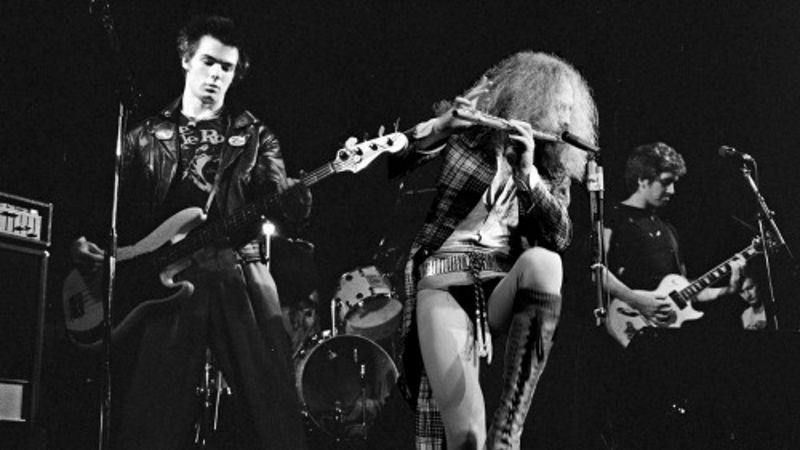 THE JETHRO PISTOLS THE JETHRO PISTOLSby switchmagmx Last week during an interview with musician, Ryan Adams, the host of ‘Jones’s Jukebox’ Steve Jones, mentioned that the one person he would love to make an album with would be none other that Jethro Tull frontman, Ian Anderson. “Me, Paul Cook, Glen Matlock, to do a record with Ian Anderson. I think that would be fantastic!” the ex-Sex Pistols guitarrist said on his radio show. You can find the clip of the interview below. We reached out to Ian Anderson, who is currently preparing for his upcoming 2017 to get a comment about this interesting collaboration: Anderson: “Hey - even I would like to make a record with me. Problem is, I am always so busy on tour and locking myself up in a small room for weeks seems like a bad idea. But, when I bought the first sex pistols album back in 77 I often wondered what it would have been like to be in the studio with those guys with all the excitement and trepidation in entering the whacky world of showbiz. Because, in the hands of Malcolm McLaren, that’s what it was. Not traditional showbiz but showbiz nonetheless. Anyway - they definitely didn’t need a flute in their band! I did play flute with a thrash-punk band later. The Six And Violence. NYC manic crazy guys who took my fancy and they asked me to contribute to their album ‘Lettuce Prey’ with a track called Bursting Bladder. Check it out. Steve Jones - play this one!” By the mid-to-late-’70s, prog had more or less faded into the underground. The golden age had ended, and besides Yes, Genesis, and ELP’s poppier releases, the best selling prog records were now by the bands that dominated the new FM format. In the UK progressive rock was frowned upon in the punk community. But still even after the punk scene came and went, many of the artists were secretly fans of progressive rock music. John Lydon, the ex-singer of the Sex Pistols was a big fan of Jethro Tulls album “Aqualung” which included some songs that had anti-religious themes such as the song “My God”. Anderson: “I didn’t know Johnny Rotten at the time but I did meet him further down the line. Well, many years later at an awards ceremony and he was really nice to me. We got on really well but what surprised me the most… no, what ‘shocked’ me was seeing him chatting away with Phil Collins. They were the best of buddies… fine but, well it didn’t seem right, somehow.” Thick as a Brick meets Nevermind The b*****s. That’s one concept album that would be amazing to hear. You can listen to Jonesy’s Jukebox every weekday from Noon to 2 pm on 95.5 KLOS in Los Angeles, California. switchmagmx.com/post/157856775072/the-jethro-pistols
|
|
|
|
Post by maddogfagin on Mar 8, 2017 8:53:02 GMT
www.ultimate-guitar.com/news/general_music_news/ian_anderson_is_jethro_tull_really_over.htmlIan Anderson: Is Jethro Tull Really Over"It's a little disingenuous for me to talk about 'the band' Jethro Tull," the frontman explains. Posted 13 hours ago, 7 March 2017  Ian Anderson was recently asked by Eon Music whether Jethro Tull "is really finished," to which he replied: "Well, the band Jethro Tull is arguably 32 different members over the years, and by that definition, yes, it is finished. "Those guys who were there when Jethro Tull became most successful in the early to mid '70s aren't not around anymore - there's only one of them, apart from me that still plays music, the others have all gave up playing music many, many years ago, and you've the members who are sadly no longer with us. "So the big body of membership of Jethro Tull, at this point in the day, I think, it's a little disingenuous for me to talk about 'the band' Jethro Tull, because it means so many different things; in terms of all those people who've given their individual input into the band, and given their time, and their passion, and their efforts. "When I'm the only guy left from the early days, I think of 'Jethro Tull' as the repertoire; I think of Jethro Tull as all those people, but when I’m performing today, I'm performing 'the music of Jethro Tull.' The musician added: "If I think of Mozart, I'm not thinking about 'the man'; if I think of Beethoven, I'm not thinking about 'the man'; I'm thinking about the repertoire. We say, 'Oh I love Beethoven' - you don’t mean you love Ludwig Van Beethoven; what you mean is you love his music, the repertoire that he left behind, which is what really defines people, at the end of the day. "Looking at Jethro Tull in the musical sense, then it is a large group of people, and it is a repertoire, and I don't think I would want to apply that to today's world. If you see 'Jethro Tull' as a billing, it means 'Jethro Tull – the music'; it doesn't mean necessarily a particular collection of musicians. It can't do that and be somehow representative, not after 49 years, anyway. "I'd also like to stress that Jethro Tull is the name of an 18th century agriculturalist who invented the seed drill; it's his name. I do feel a little guilty of having been responsible, inadvertently, for identity theft. I didn't know when our agent named us 'Jethro Tull' in January of 1968 that we'd been named after a historical character."
|
|
|
|
Post by JTull 007 on Mar 8, 2017 13:30:05 GMT
www.ultimate-guitar.com/news/general_music_news/ian_anderson_is_jethro_tull_really_over.htmlIan Anderson: Is Jethro Tull Really Over"It's a little disingenuous for me to talk about 'the band' Jethro Tull," the frontman explains. Posted 13 hours ago, 7 March 2017 "When I'm the only guy left from the early days, I think of 'Jethro Tull' as the repertoire; I think of Jethro Tull as all those people, but when I’m performing today, I'm performing 'the music of Jethro Tull.'
The same is true when Martin Barre performs his set list as "Blues, Rock, TULL". TULL 2017 is REAL.  |
|
|
|
Post by ash on Mar 8, 2017 17:54:24 GMT
www.ultimate-guitar.com/news/general_music_news/ian_anderson_is_jethro_tull_really_over.htmlIan Anderson: Is Jethro Tull Really Over"It's a little disingenuous for me to talk about 'the band' Jethro Tull," the frontman explains. Posted 13 hours ago, 7 March 2017 "When I'm the only guy left from the early days, I think of 'Jethro Tull' as the repertoire; I think of Jethro Tull as all those people, but when I’m performing today, I'm performing 'the music of Jethro Tull.'
The same is true when Martin Barre performs his set list as "Blues, Rock, TULL". TULL 2017 is REAL.  Funny I'm just interested in hearing the music...I know I'm odd  |
|
|
|
Post by maddogfagin on Mar 9, 2017 8:52:10 GMT
www.planetrock.com/news/rock-news/jethro-tulls-ian-anderson-distances-himself-from-the-tedious-grammys-and-rock-hall-of-fame/Highly likely a "cut 'n' paste" from other sources:Jethro Tull’s Ian Anderson distances himself from
the ‘tedious’ Grammys and Rock Hall of FameWednesday, March 8th, 2017 12:59pm Jethro Tull lynchpin Ian Anderson insists he’s not interested in ever being inducted into the Rock and Roll Hall of Fame. Despite being eligible for the Hall of Fame since 1993, Jethro Tull haven’t even made the shortlist once – something that’s unlikely to lose Ian any sleep. Speaking to eonmusic about Tull’s triumph over Metallica in the ‘Best Hard Rock / Metal Performance’ category at the Grammys in 1989, Ian said: “It would be nice to be able to not talk about Grammys full stop, and even more so, the American Rock and Roll Hall Of Fame. “I mean, I find these (events) really rather tedious; it’s America, I don’t come from America, I don’t play American music, I don’t belong in the Rock And Roll Hall Of Fame, and the Grammy thing was just a one-off little moment where five thousand members of the National Academy of Recording Artists decided to award to Jethro Tull rather than Metallica.” Ian explained that Jethro Tull didn’t even attend the 1989 Grammy Awards as their record label “didn’t think it was really worth the expense of flying us over to Los Angeles because Metallica were favourites to win it.” He added: “We got the news (of the win) while we were sitting in the studio; a representative from Chrysalis Records called us and said: ‘Congratulations, you’ve won the Grammy!’, and I’m not sure if we could hear the boos at that point, but clearly it was a very unpopular win. “Poor Alice Cooper, being the presenter had to step to make a rather dubious acceptance speech on my behalf. But Metallica took it in reasonably good grace, and took out an ad the next year when they did win the Grammy, thanking Jethro Tull for not bringing out a new album that year.” Just last week, KISS bassist Gene Simmons gave the Rock and Roll Hall of Fame a fresh tongue lashing for inducting artists outside the sphere of rock music. The ever-opinionated Demon said: "There are people from different genres that I don't believe belong in the Rock And Roll Hall Of Fame. "There's disco and rap and all kinds of stuff. And I highly respect rap, but on the day Led Zeppelin gets put into the Hip-Hop Hall Of Fame, is the day I will personally accept rap artists as being brought into the Rock And Roll Hall Of Fame. It just ain't the same thing. “You go to Apple Music, and you go to different genres and you type in 'rock,' you're not gonna find a single rap band in that category. Likewise, if you look at hip hop or rap, you're not gonna see AC/DC or KISS in the list in there." Jethro Tull’s new album ‘String Quartets’ is released on Friday 24th March.
|
|
|
|
Post by JTull 007 on Mar 12, 2017 2:58:28 GMT
Ian Anderson of Jethro Tull 2:00 pm on 12 April 2014  LINK LINK  Ian Anderson, flute player and creative musical director for more than 40 years with his band Ian Anderson, flute player and creative musical director for more than 40 years with his band
Jethro Tull, is equal parts musician, composer, producer - and a very astute business man.
Since they formed in 1967, Jethro Tull has sold more than 60 million albums.
In April 2014 Anderson releases a new solo studio album called Homo Erraticus
on his own Calliandra Records label. Trevor Reekie talks to Ian Anderson.   
|
|
|
|
Post by maddogfagin on Mar 18, 2017 8:12:15 GMT
www.gratefulweb.com/articles/grateful-web-interview-w-ian-andersonGrateful Web Interview w/ Ian AndersonSubmitted by Alan Sheckter on Thu, 03/16/2017 - 16:17 Ian Anderson, once and always front man of the legendary Jethro Tull is embarking on two major projects: a new album in which he and a British string quartet created of reworked Tull classics, as well as some major U.S. touring of a program dubbed, “Jethro Tull, performed by Ian Anderson.” Anderson took time recently to speak to Grateful Web via telephone. LINK
|
|
argentull
Journeyman
  Live Detective
Live Detective
Posts: 239 
|
Post by argentull on Mar 18, 2017 13:29:00 GMT
These interviewers make me mad...they don´t seem to know too much about Tull. Nobody asks about the reissue projects for example...
|
|
|
|
Post by maddogfagin on Mar 19, 2017 8:39:18 GMT
These interviewers make me mad...they don´t seem to know too much about Tull. Nobody asks about the reissue projects for example... Agreed. The so called rock journalists are, in most cases, absolute rubbish at asking the questions that fans want to know the answers to and fall back on the old well worn and hackneyed ones. I wonder how many times IA has replied to the question "So why do you stand on one leg". |
|
|
|
Post by JTull 007 on Mar 21, 2017 2:51:52 GMT
14 minute interview last year in Seattle, Washington  LINK LINK 
Ian Anderson Schools Us On Jethro Tull
October 27, 2016 3:23 PM By Scott VanderpoolJethro Tull sits in some pretty good company among the Great Bands of Rock and Roll History
who’ve been utterly and completely snubbed by the Rock and Roll Hall of Fame…they’ve been eligible
for 23 years now, and never so much as a nomination. Which of course does not reflect well on
the rock hall in Cleveland. Hello? Cleveland?
There are still some who will address the band’s creative genius Ian Anderson as “Jethro” or “Mr. Tull”,
but Friday night in the Moore Theater he’ll introduce us to the real Jethro Tull. Sort of.
He’s made him the focus of what Pete Townsend would call a “rock opera”, a multi-media extravaganza
that brings the powdered wig wearing inventor of the “seed drill” into the 21st Century…
and it includes most of Ian’s rock classics!
I got the chance to talk with him from his Portland hotel room coming out of the bullpen for Gary Crow…
|
|
|
|
Post by maddogfagin on Mar 24, 2017 8:26:36 GMT
indeflagration.fr/Interview with Ian Anderson from Jethro Tull: the philosopher of prog rockIt was a great honour for us to be able to speak to Ian Anderson, rock legend and frontman of Jethro Tull, one of the great prog rock bands of the 1970s. An honour. There is no other word to describe how we felt the possibility to discuss with Ian Anderson, rock legend and leader of Jethro Tull. Yes, the mythical 70s prog rock band, fusing folk, blues, hard rock with ornate lyrics and wonderful flute playing by the man himself. indeflagration.fr/in-english/ian-anderson-jethro-tull-interview/
|
|











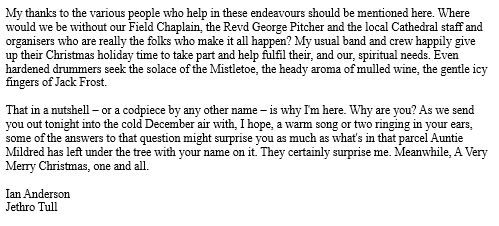























 But probably best in Humor, Games and Fun Thanks for sharing.
But probably best in Humor, Games and Fun Thanks for sharing.
